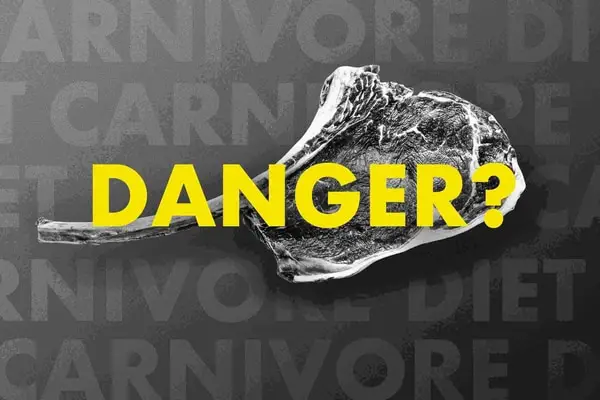12 Dangers of the Carnivore Diet (#7 is Debatable)

As an Amazon Associate we earn from qualifying purchases made on our website. If you make a purchase through links from this website, we may get a small share of the sale from Amazon and other similar affiliate programs. You can read our complete legal information for more details. By using this site, you agree the information contained here is for informational purposes only. For specific medical questions, consult your doctor. NO information on this site should be used to diagnose, treat, prevent or cure any disease or condition.

The carnivore diet sounds extreme as you are essentially removing all plant food which can be alarming. Is it Dangerous? YES! and NO! I’ve scoured the web for answers and found the most heavily talked about “so-called” dangers of the carnivore diet.
Below you will find twelve of most talked about dangers of the carnivore diet, why it could be dangerous, and also give a counter-argument of why that might not be the case. Either way, you will be surprised!
Danger #1 Nutrient Deficiency
One of the concerns about going full-on carnivore is that you may miss out on some of the beneficial plant compounds that are found in your standard non-meat foods like fruits, veggies, fungi, grains, and legumes.
It’s a valid concern.
Questions arise like, “what about all the nutrients in plants that you are missing out on? Aren’t you going to develop problems associated with nutrient deficiencies?”
World-Renowned nutritionist and functional medicine extraordinaire, Kriss Kresser, believes there are a handful of vitamins that may be a challenge to obtain on a carnivore diet. This list is potentially the most susceptible to deficiency.
- Vitamin C
- Vitamin E
- Vitamin K2
- Calcium
- Vitamin A
- Folate
- Manganese
- Magnesium
Kresser does note that if you include dairy with your carnivore diet it should cover your calcium and vitamin K2 intake but does go on to say, “I don’t think we have enough evidence to unequivocally say that this diet has no risk of producing nutrient deficiencies.”
While reading the book “The Carnivore Diet”, by Dr. Shawn Baker he challenges the idea of deficiencies of vitamins and minerals while eating an all-meat diet. He brings up numerous points where animals on low-carb or all meat diets have a change in biochemistry and absorption.
It seems that vitamins and minerals compete with carbs and glucose for absorption thereby when removed all the meat you eat doesn’t compete. Perhaps it’s super bio-available!
For instance back in the late 1800s researchers studying the disease “Beriberi”, which leads to neurological problems and cardiac disease as a result of low thiamine levels, found that animals on a low-carb diet and low-level consumption of thiamine didn’t develop the disease but animals fed a high-carb diet and low thiamine did.
Let’s look at Magnesium, an important mineral for physiologic function. People low on magnesium are susceptible to develop numerous diseases. Researchers have found that magnesium plays a role in carbohydrate metabolism and some evidence of a relationship between glucose levels and magnesium levels.
Does this mean a high glucose level will diminish the effects of magnesium? Do you need less magnesium or other nutrients with having less glucose in the blood? Perhaps when you eat all meat the magnesium isn’t competing with the glucose and is easier to absorb.
Is that the case with the whole slew of essential vitamins and minerals?

Dr. Baker brings up some interesting points with regard to our current knowledge of vitamins and minerals. He believes it’s difficult to make assessments on vitamin deficiencies when looking at overt clinical symptoms and sub-clinical symptoms like low energy, sleep problems, and mood swings.
After looking at symptoms you are reduced to looking at blood tests which Dr. Baker thinks is even more of a challenge.
Blood Test Issues
Blood tests bring their own inadequacies as he states they can change easily based on what you eat, the temperature, exercise routine, if you have an injury or illness, or how much you sleep.
Hey basically says the fluctuation of minerals and vitamin factors in your blood changes so easily that it makes predicting chronic issues almost useless.
He believes a biopsy is a far superior way of trying to figure out your nutritional state but these studies are painful, expensive, and risky.
Danger #2 Vitamin C & Scurvy
Technically vitamin C falls in the previous category but it’s an interesting topic with sensational headlines and symptoms.
Scurvy is a nasty disease that is the result of a lack of vitamin C. According to Medical News Today, “scurvy can lead to anemia, debility, exhaustion, spontaneous bleeding, pain in the limbs, and especially the legs, swelling in some parts of the body, and sometimes ulceration of the gums and loss of teeth.”
We should also mention death!
Basically, if you eat only meat because it doesn’t have vitamin C and the human body doesn’t produce it you will get a vitamin C deficiency and ultimately scurvy, right? It seems, no and no…unless you eat only dried and salted meat, that will give you scurvy like the old school sailors.
The USDA doesn’t list Vitamin C as one of the nutrients found in meat but a study done by carnivore diet practitioner, Amber O’hearn, found that not to be the case. Meat does in fact contain Vitamin C!
I wrote an interesting article, “Do You Need Vitamin C on the Carnivore Diet?”, which brings up some crazy issues with meat and vitamin C.
So what’s the deal with vitamin C and meat? It’s been a known remedy for 100s of years that people diagnosed with scurvy who eat, “fresh meat” are cured, and “fresh meat” was used as scurvy prevention.
I found that Vitamin C competes with glucose when being absorbed in the human body. If you are eating or drinking a ton of carbs and sugar your diminishing your body’s ability to absorb the vitamin C.
If you are on an all-meat diet glucose is almost at complete zero making vitamin C more absorbable thus apparently requiring less of it.
Paleomedicina Group in Hungary has shown that their patients on a strict carnivore diet have normal vitamin C levels and vitamin C derived from animal sources was more effective when compared to plant-based sources.
The hypothesis is that when on a zero-carb diet the absorption of vitamin C, (maybe other vitamins and minerals), is more efficient and your bodies requirement goes down…which leads us to the USDA and their Recommended Daily Allowance of vitamin and Minerals.
When the federal government was coming up with their recommendations they were using a model and research that consisted of high-carb diets and didn’t use numbers or studies from low-carb/high-fat diets.
Making one ask the question of how accurate are they?

Danger #3 High Cholesterol
When you go on an all-meat diet it can be assumed your cholesterol will go up and you may increase your chances for heart disease and an early death.
Most doctors say high cholesterol is bad and all the saturated fat you are eating may raise your LDL, (bad cholesterol), thereby increasing your risk for heart disease, the number one killer.
A lot of doctors like to point to a study titled, “Effect of low carbohydrate high fat diet on LDL cholesterol and gene expression in normal-weight, young adults: A randomized controlled study.” This is a randomized control study that showed cholesterol levels of LDL-C raise by 44% over 3 weeks when on a high fat low-carb diet versus controlled subject.
Here is another study often used to show that high cholesterol levels are dangerous and lead to an early death. The study titled, “Association Between Baseline LDL-C Level and Total and Cardiovascular Mortality After LDL-C Lowering: A Systematic Review and Meta-analysis.”
This test took data from different groups of people, one with aggressive cholesterol (LDL-C) lowering medication, one without cholesterol-lowering meds, and a control group. They concluded that the aggressive lowering medication group had a reduction in mortality and not just due to heart disease.
There are plenty of other studies that show high cholesterol is bad but these studies are usually based on epidemiology and therefore not factual or very useful.
This would mean lower cholesterol is better than higher? Once again we find ourselves in a highly debatable topic.
Dave Feldman, a lipid researcher and software engineer has his own research which concludes with the idea that high LDL-C and high LDL-P (to so-called bad cholesterol), is not as dangerous if your HDL is high and triglycerides are low.
Dave has shown that’s it’s fairly easy to change your cholesterol levels by 100 points within a few days just by switching what you eat.
Therefor test accuracy is difficult.
Another study shows you can raise your cholesterol by 36% just by fasting for a week.
Does this mean fasting and eating meat are both bad because they raise cholesterol levels?
In this video he explains his theory of cholesterol when on a low-carb diet.
Dr. Shawn Baker believes we have other factors that may trump the cholesterol issue, those being the evidence that shows heart disease risk is amplified more by hyperinsulinemia, inflammatory status, and triglyceride levels.
There is strong bias with cholesterol studies which favor the idea of higher cholesterol being bad and an easy remedy is pharmaceuticals.
Who benefits from this idea? Big Pharma.
Dr. Baker goes on to explain, “…some of the associative factors that are believed to be a contributor to heart disease, you will find the relative effect of cholesterol level to be relatively lower on that list. If you then stratified those factors by things that can be most efficiently adjusted by drugs rather than lifestyle changes, you would see cholesterol at the top of the list. Not surprisingly, billions of dollars have been focused on the factor that is drug-modifiable whereas the lifestyle factors largely receive lip service.”
He believes cholesterol is not a “bad guy” it’s a good thing as our brains use around 25% of our bodies cholesterol. Cholesterol is used in hormones and every cell in your body has it.
In fact there are studies that show low cholesterol can be associated with depression, cancer, violence, suicide and neurodegenerative diseases…oh it messes with your sex drive as I took a deep dive on that topic in, “Is Low Cholesterol Bad For Your Sex Life?”
Danger #4 No Fiber Poop Problems
Fiber is a dietary substance found in plant matter that humans are not able to digest with their set of digestive enzymes. However, if you go on a Carnivore Diet you are not consuming fiber as animal matter doesn’t have any.
So, what about pooping? Isn’t fiber related to having good bowel movements?
That’s what we have been programmed to think but in actuality, it isn’t true.
Plenty of long term all meat dieters have reported no problems with bowel movements and consider them as “regular”. In fact, there are two studies showing that when fiber was added to the human diet it increased their levels of constipation, bloating, and discomfort.
Check out these studies:
- “Systematic Review: The Role of Fibre in the Treatment of Irritable Bowel Syndrome.”
- “Stopping or Reducing Dietary Fiber Intake Reduces Constipation and its Associated Symptoms.”
And of course we have compiled a fun filled post of pooping, constipation and fiber in these posts.
Personally, ever since going on a carnivore diet, I have had way better bowel movements, little to no gas, and my stomach is hardly ever in discomfort. Hundreds of thousands of other carnivores have reported the same benefits.
What about fiber and how it reduces cholesterol?
Fiber can lower cholesterol and we discussed the potential benefits and negatives of cholesterol in the previous section.
The other benefit of fiber is the reduction of blood glucose. For instance, when you eat an apple high in fiber and sugar your glucose doesn’t spike as much when compared to apple juice…thanks to the fiber.
When eating an all meat diet, naturally you don’t have to worry about glucose spikes.
Danger #5 No Phytonutrients
Going all meat means you are not getting phytonutrients that are found in plant food. Phytonutrients are compounds produced by plants that protect it from those that would want to consume it, basically their own natural pesticides.
Doctors and researchers in the carnivore community have found phytonutrients to be a nuisance to your health and/or toxic.
I even dived in on the topic with these two posts:
However other doctors and researchers say they are good.
Chris Kresser says, “(phytonutrients) act as acute stressors that actually make us stronger through “Hormesis” much like how resistance training is an acute stressor that activates several different pathways in the body…reducing inflammation, enhance immunity, improve cellular communication, repair DNA and potentially detoxify.”
This study by researchers show the positive effect of phytonutrients.
Dr. Shawn Baker rebuts the argument of having to keep plant food (phytonutrients) in the diet by explaining they are not essential.
What plant is essential for life?
He goes on to explain that phytonutrients are over rated and there isn’t enough evidence or studies to support keeping them in your diet is worth it.
Danger #6 Kidney Health and Gout
Most doctors would probably agree that heavy consumption of sugar, alcohol, and meat is going to have negative effects on your kidneys and even lead to gout.
Gout a disease in which defective metabolism of uric acid causes arthritis, especially in the smaller bones of the feet, deposition of chalkstones, and episodes of acute pain. I have a few friends that have it and it sucks.
People unfamiliar with the carnivore diet will point out that meat and shellfish have high amounts of purine, a compound that creates uric acid in the body. Diets high in purine are said to lead to kidney stones and gout.
The problem with this theory is that most foods lead to the accumulation of purine and gout can develop from the excess of sugar and alcohol.
Dr. Shawn Baker has even found people with gout who go on the carnivore diet will see a decrease and recovery of symptoms within a few months.
He mentions there is a caveat as people that are already predisposed to getting gout or if they already have gout can get a flare-up during the transition phase of the diet but it tends to go away.
Here are some success stories of people with gout and the effect of the carnivore diet.
It has been noted that those who are fully transitioned to the carnivore diet that the gout usually disappears for good.

Danger #7 Too Much Protein Kidney Overload
You’ve probably heard that too much protein can be a problem and damage your kidneys. When listening to a podcast with Dr. Stuart Phillips, a leading protein expert, he mentioned that people who bring this misconception up are usually referring to a study that was done on rats and that there isn’t a mimicked study on humans.
He said protein doesn’t damage kidneys but if you have damaged kidneys already they can leak protein. There isn’t scientific evidence proving protein damages kidneys.
Dr. Shawn Baker goes on to say that as with all misconceptions regarding diet you can find an epidemiological study that could support the idea that high protein is damaging to kidneys but does it apply to all people in that situation?
He further goes on to say, “…people who eat a high-protein carnivore diet aren’t finding their kidneys compromised. I’m not saying that no one who follows the carnivore diet will ever have kidney problems; they can occur for many reasons.”
There is plenty of historical accounts of our ancestors eating very large amounts of meat in their diet and not experiencing kidney problems.
Danger #8 Cancer
In 2015 vegetarians and vegans rejoiced as the World Health Organization classified meat as class 2 carcinogen and processed meat as a class 1 which is the same class as cigarettes.
The level of risk of eating red meat and processed meat and developing colon cancer was 17 and 18 percent respectively…..hmmm really?
However, scientists around the world criticized the WHO for coming up with this proclamation for a bunch of different reasons. Mostly because the study was biased and contained predominantly epidemiological studies.
Dr. Georgia Ede destroyed this WHO report with her own legendary critique which I’m hoping you will read here, titled “WHO Says Meat Causes Cancer?”
She easily dismantles the WHO report and explains that their data clumps meat-eaters in with people that eat junk food, heavy amounts of sugar and nasty vegetable oil.
Plus the other research had studies that used rats which are already prone to get cancer at high rates and the food they were given could have easily given the cancer anyway. She goes on to state that these rat studies don’t equate to humans and are incapable of relating to the habits of carnivores.
Also, panel member, Dr. David Klurfield, expressed his concern that the contradictory evidence against the WHO report was unfairly dismissed and he also brings up the fact that a large number of the panelists were vegan or vegetarian but didn’t disclose it on the report.
Do you think the report could be biased?
Danger #9 Microbiome and Carnitine Problems
There is a theory that an all-meat diet could change the microbiome of your gut.
The gut bacteria that thrive on meat also turns carnitine, an amino acid, into a potential artery destroyer trimethylamine (TMA). Basically this TMA gets converted into an oxidized form in the liver called trimethylamine N-oxide (TMAO) which is potentially dangerous to arteries.
Here is a New England Journal of Medicine study showing the relationship between TMAO and cardiovascular disease.
And here is a study by the Department of Cellular and Molecular Medicine, Cleveland Clinic showing the relationship of carnitine and atherosclerosis.
Once again Dr. Georgia Ede has dissected these findings and revealed that the mice used in the research were fed a supplementary form of carnitine not naturally found in meat and the humans in the study didn’t have an accurate documentation of their diets. The conclusion was based on epidemiology.
Feel the wrath of Dr. Georgia Ede as she unwraps the bias of these studies in “Does Carnitine from Red Meat Cause Heart Disease?”
The craziness is we have no idea what levels of TMAO are in the bodies of carnivore dieters or if there is even causation to having higher levels of TMAO and heart disease.
Oh and sorry pescatarians, vegetarians and vegans…fish and vegetables are able to raise TMAO too.
Danger #10 Lack of Fiber = No Butyrate
Butyrate is a short-chain amino acid that helps reinforce cells in your colon known as colonocytes. The fermentation of fiber in the gut is what produces butyrate but what anti-keto and anti-carnivore people fail to mention is that those of us on a low-carb diet are able to produce ketones have the ability to use the ketones and make hydroxybutyrate.
Hydroxy butyrate can be converted into usable butyrate for our colonocytes.
People on a high-carb or Standard American Diet would therefore most likely need to keep fiber in their diets in order to get their butyrate.
Danger #11 Low Thyroid Hormones
Chris Kresser challenges the long term effects of the carnivore diet by stating, “there is zero long-term data about how an all-meat diet impacts hormones, thyroid function, and fertility.”
Kresser says the lack of carbohydrates can potentially alter the function of the thyroid as glucose is what stimulates the conversion of thyroid hormone T4 to active T3.
However, Dr. Shawn Baker believes that the “normal” level of thyroid hormone is debatable and the people that come up with the “normal” range have a hard time understanding what the clinical context of the information means.
He says, “low levels of thyroid hormone can be completely normal as long as clinical function (a person’s energy, mood, skin condition, and so on) is fine.”
He believes these people don’t need to take pills or ingest more carbohydrates. He states, “you don’t need to take a pill for a symptom you don’t have just because of the numbers on a lab test.”
Danger #12 Liver Damage
According to Chris Kresser, he believes if you eat too lean of meat with not enough fat the carnivore diet can overtax the liver.
He goes on to say, “when you don’t eat sufficient carbohydrates and fat your liver can make glucose from protein via a process called “gluconeogenesis”. This process creates nitrogenous waste, which converts to urea and disposed through the kidneys.”
Kresser believes there is a limit on how much protein the liver can deal with and states that if over 35% of your calorie intake is protein this could be a problem. He also states this amount lessons for pregnant women, closer to 25%.
However, Dr. Shawn Baker doesn’t share the same perspective. He believes those on the carnivore diet tend to have a normal liver function and that the assumption that too much protein is bad for the liver is fallacy.
He says there is observational data of carnivore populations and studies of people on low-carb diets which shows that any fatty liver issues are improved.
If getting your blood work and liver function tested he cautioned that an elevation in enzymes indicating fatty liver can be affected by intense workouts for up to a week.

Cut Through The BS
What does this all mean? From what I gather there is so much false information on the internet, from the media, the politicians, and corporations with profits in mind.
Dr. Shawn Baker says it best, “Nutrition is like politics, and people fight hard for their team. Results that don’t confirm a particular bias are quickly ignored or dismissed.”
Nutrition science is heavily challenged and full of mistakes. The studies out there are usually based on epidemiology, which is inaccurate and easily used to sway a bias.
The good studies, randomized control studies, are more expensive, harder to complete are few and far in between.
I go deep on nutritional science and how it relates to the carnivore diet in:
Basically, if someone says eating meat is bad for you then maybe try to challenge that statement and not rely on a Refinery 29 blog or some mainstream media outlet.
When people spit out a study and try to change your mind don’t be lazy and just agree. Find out where the study came from, who wrote it, who financed it, and who was on the board? Is there a bias? Is the study based on epidemiology?
And when it comes to the carnivore diet, well maybe there are some dangers and/or maybe it could greatly improve your health.
It seems like with so many people trying it and having good results then perhaps it is less dangerous than it sounds. In fact, there are thousands of testimonials at MeatRX. Check them out!
Also pick up this book by Dr. Baker at Bookshop.org instead of Amazon:
And of course check out our YouTube channel for some inspiration and fun here:
Disclaimer: I’m not a doctor or dietician or nutritionist. Consult with and ask your doctor about any diet or medical-related questions. No information on this site should be used to diagnose, treat, prevent, or cure any disease or condition.



